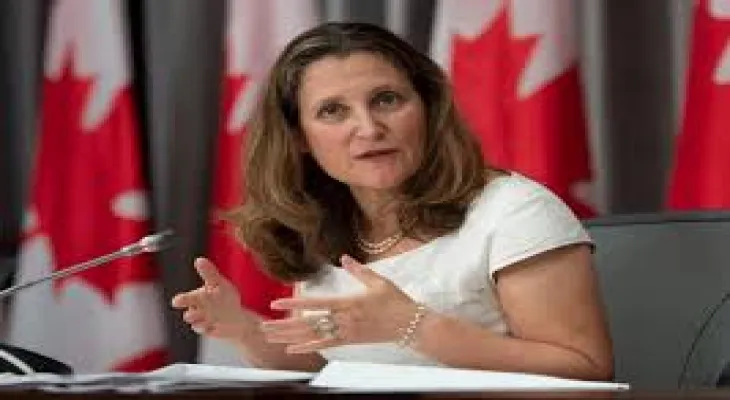Search here
Newspaper
Search here

Arab Canada News
News

Published: April 22, 2024
The Deputy Prime Minister and Minister of Finance Chrystia Freeland said she believes that dissatisfied premiers will reach measures in the federal budget that touch on provincial legislation, even while opposing it.
At an event held in Toronto on Sunday, Freeland – who presented the federal budget on Tuesday – said the national government needs to move forward on issues such as housing, and she is "extremely optimistic" that the premiers will choose to cooperate.
She said, "Housing is a national challenge, and the federal government must lead this mission."
"My personal experience is that when there are significant issues that really matter to Canadians, after all the noise and anger, people are ready to roll up their sleeves and find a win-win solution for Canadians."
Many premiers have opposed the federal government in recent months, again following the budget release on the grounds that some measures encroach on provincial jurisdiction.
In a letter issued on Friday by the Council of the Federation, which represents the leaders of all thirteen provinces and territories, the premiers said Ottawa should have consulted with them more before the budget.
Individual premiers have shared more pointed criticisms.
Alberta Premier Danielle Smith said earlier this week, "My initial thoughts on the federal budget are that it overstates taxes, spending, borrowing, and interference in provincial matters."
Alberta has clashed with the government repeatedly over housing, with Smith introducing legislation earlier this month that requires provincial oversight on deals made between municipalities and the federal government, including future agreements regarding federal housing funds.
New Brunswick Premier Blaine Higgs said on CBC's Power & Politics on Friday, "It’s an endless spending platform that we’ve seen now over the last ten years."
Freeland said on Sunday that, for example, the federal childcare program, negotiated through a series of deals with provinces and territories, demonstrates that cooperation is possible.
Criticism of changes to capital gains tax
The federal government also faced some opposition over what may have been the most notable measure revealed on budget day: changes to capital gains tax rules in Canada. The government proposed raising the inclusion rate to 67 percent on capital gains over $250,000 for individuals.
Freeland said on Sunday, "The winner takes all in the 21st-century economy makes those at the top richer, while many middle-class Canadians are suffering,” adding that the government is asking wealthy Canadians to pay their fair share.
Treasury Board President Anita Anand said in an interview on Rosemary Barton Live on Sunday, "We need to make sure we’re getting some revenue. And this is a very limited way of ensuring that happens."
Critics have raised concerns that the changes could lead to reduced investment or capital flight.
Kirk Simpson, CEO of the technology company goConfirm, said in a separate interview on Rosemary Barton Live, "The biggest concern now is, will this have a negative effect on the progress we’re trying to make in making Canada a hub for innovation?”
Simpson told CBC’s Chief Political Correspondent Rosemary Barton, "With productivity as it is now, we want more capital, not less, flowing into business innovation."
Freeland said on Sunday that the changes will affect very few Canadian individuals – the government estimates 0.13 percent – and that the revenue will go to fund investments in areas such as housing.
Comments